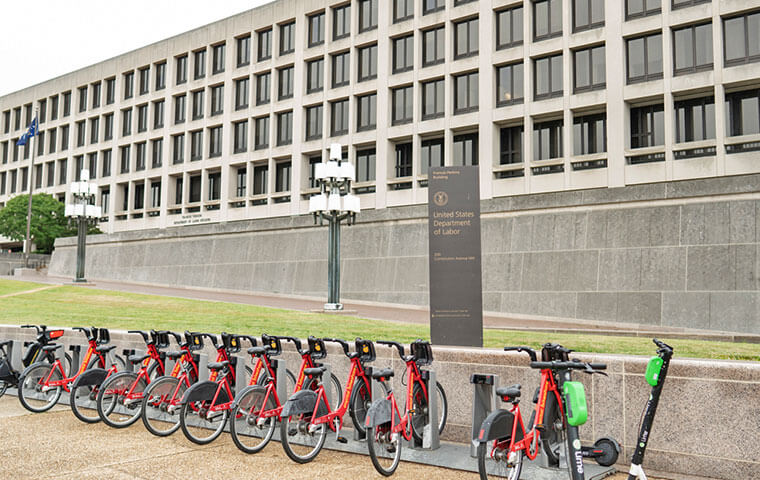 Unrented bikes in front of a quiet Department of Labor Headquarters in Washington DC. How to deal with underutilized office space remains a focal point of upcoming negotiations. Image: 010110010101101/Shutterstock.com
By: FEDweek Staff
Unrented bikes in front of a quiet Department of Labor Headquarters in Washington DC. How to deal with underutilized office space remains a focal point of upcoming negotiations. Image: 010110010101101/Shutterstock.com
By: FEDweek StaffAlthough the Senate version of the annual general government appropriations bill mirrors the House version in effectively endorsing a 2 percent federal employee raise in January (see related story) they differ on other workplace issues.
That bill—along with the DoD authorization bill — is a main annual vehicle for Congress to act on ongoing federal workplace issues. With Congress on recess until after Labor Day, initial floor votes are a month or more away, and final action may be left until after the elections. However, the bills represent a way to take policy stances ahead of the elections.
The House bill for example would ban enforcement of Biden administration DEI initiatives and reimposition of COVID-19 vaccine or mask mandates in the federal workplace; and ban investments through the TSP mutual fund window in funds that use environmental-social-governance criteria in selecting investments. Further, an amendment has been offered for floor voting to ban coverage of gender-affirming care in the FEHB program.
The newly released Senate version contains none of those provisions.
Both would require more detailed disclosure of telework policies and rates, and the related issue of building occupancy rates and the cost of underused space, although in slightly different ways. The House bill orders OMB and GSA to produce a plan within six months for reducing office space where the utilization rate is less than 60 percent, based on 150 usable square feet per person. The Senate version calls for similar data but only for “a description of each agency’s effort to reduce its office footprint” if it falls below that mark.
The Senate bill meanwhile “strongly urges” OPM to issue guidance on determining when a teleworking employee’s salary should reflect the rates where they actually live rather than the usually higher rates of the agency site to which they are assigned. That guidance further should “provide guidance/training to supervisors and employees, conduct surveys, and/or perform reviews to ensure that OPM’s locality pay regulations are being followed, as applicable.”
Stronger steps to limit telework remain under consideration, however. The House appropriations bill covering DoD would generally bar offsite work there, while a newly offered bill in the Senate (S-4834) would set the salaries of all federal employees who telework once a week or more at the “rest of the U.S.” rate regardless of their official duty stations—resulting in a pay cut for those not already in that catchall locality.
Neither spending bill would put in law a ban against a future excepted service Schedule F for policy related jobs currently in the competitive service. Democrats however plan to offer one for House voting, as well as in Senate voting on the defense authorization bill.
Both of the appropriations bills meanwhile would continue several long-running workplace policies that must be renewed annually. These include a general requirement that FEHB plans cover prescription contraceptives but not abortion; a ban on training not directly related to an employee’s official duties; and a ban on studying commercial type federal jobs for possible contracting-out.
Senate Eyes Vote to Pay Federal Employees Working Unpaid
Series of Bills Offered to Address Shutdown’s Impact on Employees
Public Starting to Feel Impact of Shutdown, Survey Shows
OPM Details Coverage Changes, Plan Dropouts for FEHB/PSHB in 2026
Does My FEHB/PSHB Plan Stack Up? Here’s How to Tell
2025 TSP Rollercoaster and the G Fund Merry-go-Round
See also,
TSP Takes Step toward Upcoming In-Plan Roth Conversions
5 Steps to Protect Your Federal Job During the Shutdown
Over 30K TSP Accounts Have Crossed the Million Mark in 2025

